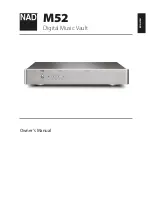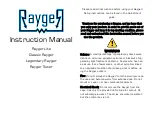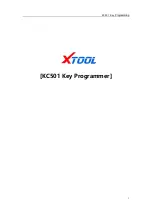
Remove a Smart Sensor probe from its protective
package. Remove white serial number strip from inside
the Smart Sensor (see step 4 below for serial number
strip placement instructions). If this is the first time you
have used a Rapid RH™ system, please place the Rapid
RH™ Reader into the Smart Sensor. This preliminary
test will make it easier to align the reader once the Smart
Sensor is inserted into the concrete.
To properly insert the Reader, line up the white serial
number strip on the Smart Sensor with the white serial
number strip on the Rapid RH™ Reader. Insert the
Reader, twist 45 degrees clockwise and press the “ON” button. Verify that
numbers appear on the screen (see step 4 for instruction on taking readings)
Next, insert the Smart Sensor into the drilled hole. (Make sure that the Rapid
RH™ Reader is not installed in the Smart Sensor.) Use the orange plastic insert
tube attached to an orange cap and firmly press the Smart Sensor into the hole
until the Smart Sensor seats itself at the bottom of the hole.
For a 1¾” (44.5mm) deep hole, the top of the Smart Sensor will be approximately
¼” below the surface of the concrete.
For holes deeper than 1¾” (44.5mm) use the
white insertion
tool (avaible at
rapidrh.com
).
To keep debris from getting into the Smart Sensor place
the protective cap with the orange insert into the Smart
Sensor until ready to take readings.
Follow ASTM F2170-02 procedures pertaining to
stabilization time. The Smart Sensor has an equilibration
time of 30 minutes to several hours depending on
concrete and conditions.
Step 3:
Place the Probe
Installation Instructions
Insertion Tool (for deeper holes)
Remove the orange protective cap. Line up the white serial number strip on the
Rapid RH™ Reader with the white serial number strip on the Smart Sensor. Insert the
Rapid RH™Reader, push down slightly, twist
45 degrees clockwise and press the “ON”
button. If the display shows “- -” or “ER” the
Rapid RH™ Reader has not been inserted
properly or has been twisted too far. Remove
the Rapid RH™ Reader and try inserting
again. Press the “ON” button. The display
will toggle from the %RH reading and °F
temperature reading. The probe will shut off
automatically after approximately 1 minute
(you can remove the Reader at any time).
Record readings on the enclosed report form
that has spaces for information required by ASTM F2170-02 including the date,
time, %RH and temperature.You can use the grid at the bottom of the report form
to record probe locations. Each Smart Sensor is serialized on the outside of the
Smart Sensor. A copy of the serial number is located inside the Smart Sensor and
must be removed and may be used on the enclosed report form. Extra copies of
the report form can be obtained from our website,
rapidrh.com
.
After the initial equilibration time of 1-2 hours, subsequent readings can be taken
instantly. If future testing is needed, replace the orange tube attached
to the orange
protective cap. The Rapid RH™ Reader can be left in the Smart Sensor covered by
an orange cap. However, if the relative humidity is above 95% it is recommended
that you remove the Rapid RH™ Reader between readings.
Step 4:
Take Readings
If the probe will be covered (for example,
applied floor covering or coating), place the
stainless steel metal disk over the probe
and skim-coat the hole using a cementitious
patching compound compatible with the flooring
manufacturer’s installation instructions.
Relative humidity is one of many factors necessary for construction decisions. Wagner Electronics®
does not assume responsibility for any particular construction decision based on the readings of this
instrument and does not guarantee any specific construction results.
The method of use of this instrument and the interpretation of the readings are beyond the control
of the manufacturer. Wagner Electronics® cannot accept responsibility for any loss, consequential or
otherwise, resulting from the use of the Rapid RH™ and its accessories.
The Rapid RH™ should be used within two (2) years of purchase. If the probe does not appear to
function properly for any reason, return the probe to Wagner Electronics® for replacement.
The Rapid RH™ is patented under U.S. Patent 7,231,815.
For more information on relative humidity in concrete floors and moisture testing, go to
www.cement.org to order the book “Concrete Floors and Moisture” by Howard Kanare.
Step 5:
Encapsulate the Probe
Orange Insert





















